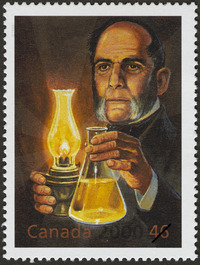I would like to introduce an invention related to today(May 2). May 2 is the date of birth of Abraham Pineo Gesner (1797.5.2-1864.4.29), a Canadian inventor and geologist.
Abraham Gesner was an inventor and geologist who, in 1842, discovered the first fossils in the Miguasha National Park, a UNESCO World Heritage Site.
And in 1846, Abraham Gessner, later called the father of the petroleum industry, refined a new oil for lighting by dry distillation of coal on Prince Edward Island, which he named kerosene. Also in the 1850s, Abraham Gessner invented a treatment process to distill kerosene from petroleum.

(Photo taken from University of Toronto, Dictionary of Canadian Biography, vol. 9)
Loris S. Russell, “GESNER, ABRAHAM,” in Dictionary of Canadian Biography, vol. 9, University of Toronto/Université Laval, 2003–, accessed April 11, 2024, http://www.biographi.ca/en/bio/gesner_abraham_9E.html.
Petroleum products made primarily from kerosene include heating oil, jet fuel, and kerosene-based rocket fuel. Kerosene is a purer and less watery version of heating oil, so even at 10,000 meters above the ground, it appears to be able to be used as fuel for airplanes without freezing.
I have seen my grandparents use heating oil stoves in the 1990s and 2000s. heating oil stoves are powerful and can boil water in a kettle or bake rice cakes, in addition to the heating function. Electric stoves are also good, but heating oil stoves, which do not use electricity, offer high thermal efficiency and can also be used during power outages. In the long history of mankind, we are grateful to our predecessors for their inventions that have enriched people’s lives with the times. (Raspberry)
Oil Pioneers”, author Katsutoshi Murakami, Ronsosha, 1996
JAXA official community site (Japanese only): https://fanfun.jaxa.jp

